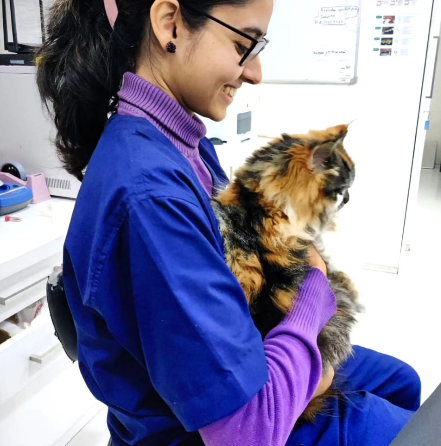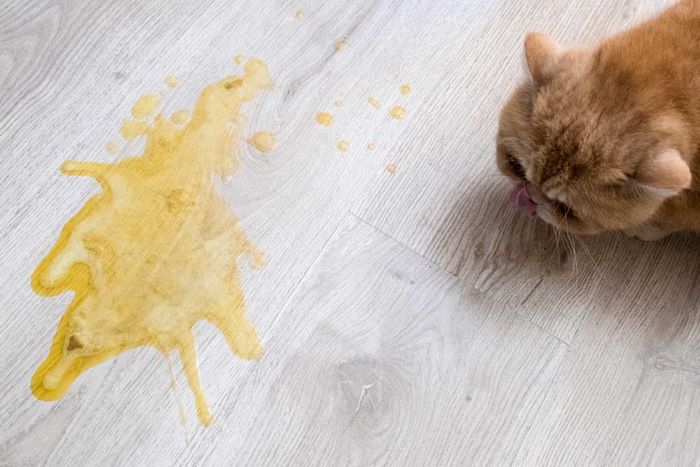Even though your cat has diarrhea, that doesn’t mean she’s not feeling fine. In reality, many cats with diarrhea appear to be completely healthy and continue to function normally. This can be confusing for pet owners, who may wonder why their cat is having trouble going to the bathroom.
Diarrhea is a common problem in cats, and there are many possible causes. In this article, we will discuss the most common causes of diarrhea in cats and what you can do to help your furry friend feel better.
What Is the Cause of My Cat’s Diarrhea?

There are many possible causes of diarrhoea in cats. The most common is due to an infectious organism that has been circulating throughout the cat population and can be transmitted from cat to cat through close contact or by ingesting contaminated food or water.
Other causes include:
- Parasites
- Dietary Indiscretion (eating something a cat should not eat)
- Stress
- Food Allergies
- Hyperthyroidism in Older Cats
- Intestinal Polyps
- Irritable Bowel Disease
- Medications your Pet may have Ingested Accidentally
- Inflammatory Bowel Disease and Cancer
Does My Cat Need First Aid for Diarrhea?
If your cat has diarrhoea, first make sure she is not dehydrated.
If she is exhibiting any of the symptoms below, you should be concerned about whether or not your pet is dehydrated. If you are unsure whether your cat is dehydrated, please take her to a veterinarian right away. She may need fluids injected subcutaneously, which requires the expertise of a veterinary professional.
Symptoms of Dehydration in Cats Include:
- Lethargy
- Depression
- Panting/Excessive Panting
- Dry Mouth and Tongue
- Sunken Eyes
- Decreased “Spark” in Her Eyes
- Weakness/Collapse
What Can I Do
First aid for diarrhoea in cats includes making sure that your cat has access to clean, fresh water at all times. Make sure the litter box is easily accessible and ideally located away from food and water bowls. To provide additional support for your cat’s gastrointestinal system, you can give him or her over-the-counter medications like Imodium A-D (available at any pharmacy).
If you notice blood in the stool, severe weight loss, lethargy, fever, or diarrhoea lasting more than three days, or if your cat doesn’t act normally after having diarrhoea, contact your veterinarian immediately. These symptoms may indicate serious illness or other medical issues.
What Can I Do to Help My Cat?
You may make your cat feel better by always having a clean litter box handy. Make sure the litter box is conveniently accessible and away from the food and water bowls.
In addition to cleaning the litter box regularly, you may want to add some fresh or dried grass or wet canned cat food into the litter to help your furry friend feel better. Dried grass contains chlorophyll, which helps stimulate intestinal motility in humans.
Chlorophyll also stimulates bile production in animals and assists with the detoxification of harmful chemicals. Studies show that it can be used for anti-inflammatory purposes and is an effective antioxidant, so there may be some benefits for cats as well.
If giving your cat dried grass is not possible, adding some wet canned cat food to the litter box may help your cat feel better and ease her gastrointestinal distress. Keep in mind that you should never give a dehydrated, vomiting, or bloody stool cat any wet canned food.
How Can I Prevent My Cat From Getting Diarrhea?
There are several ways to help prevent your cat from getting diarrhea.
The first is to make sure she is not exposed to common infectious organisms that circulate through the cat population.
Her litter box should be kept clean and in a private area away from other cats. It is also wise to keep her indoors, vaccinate her against common infectious feline diseases, and feed her high-quality commercial food. If your kitty spends time outdoors, do your best to keep him off lawns that have recently been treated with chemicals or where other cats could have left feces behind.
You should also take care when handling his stool and choose gloves and hand-washing supplies carefully if you need to handle it at all. The safest option for outdoor cats is to keep them indoors as much as possible.
Lastly, you should always be sure your cat is up-to-date on her vaccinations and within the correct weight range for her age and breed. This can help prevent future problems with obesity and gastrointestinal distress.
What Food Should I Give My Diarrheic Cat?
If your cat is having diarrhea, you should not give her any food for at least 12 hours. If diarrhea continues past 12 hours, it’s best to see a veterinarian before feeding your kitty.
Although raw diets are popular with some pet owners, they may not be right for cats that have had significant gastrointestinal distress in the past or who are continuing to experience it.
It’s also wise to avoid any new foods while your cat has diarrhea because these dietary changes could cause her digestive system additional stress and slow down recovery time.
A few types of low-fibre canned food are generally well-tolerated by recovering cats with sensitive stomachs:
- Wellness CORE Original Turkey & Chicken Formula
- Authority Harvest Baked Tuna & Smoked Salmon
- Iams Purrfect Delicacies Chicken Entrée Morsels in Gravy (a low-FODMAP food)
Other than these canned foods, it’s generally best to avoid giving your cat any other foods while she is experiencing diarrhea.
If diarrhea subsides and you switch her back to a high-fibre diet, do so gradually. Mix a small amount of the previous diet with the new one for a few days before going 100% of one or the other.
This can help prevent dietary indiscretion, which is when cats get into things they shouldn’t eat. In the case of diarrhea, this can exacerbate the problem. Also, if your cat is currently experiencing an episode of diarrhea, but does not have any other underlying health issues, it’s best to avoid dry food.
Although a low-fibre diet or fasting can help a cat with diarrhea feel better faster, you should never restrict her water intake.
Is Fluid Therapy Necessary for Diarrhea?
If your cat is severely dehydrated, intravenous fluid therapy may be necessary to combat the problem. If your vet recommends this treatment, it’s important to follow her instructions closely because she will prescribe a specific type of fluid based on your kitty’s needs. This medication can also help with electrolyte imbalances that cause diarrhea if they are present as well.
Fluid replacement can also reduce nausea in cats that are feeling sick due to gastrointestinal distress and diarrhea. Some vets find that metoclopramide (Reglan) is more effective than other medications at controlling vomiting issues related to gastrointestinal distress, but you should never give this to a cat without veterinary supervision.
What Can I Give My Cat To Get Rid of Diarrhea?
If your cat has diarrhea, you may want to give her a probiotic supplement.
Probiotics are living bacteria that help repopulate the gastrointestinal tract with healthy microbes and aid indigestion. They have been shown to be effective in treating cases of diarrheal illness in both cats and dogs by encouraging better nutrient absorption and promoting intestinal health.
You can find probiotics at most pet supply retailers or online. Just be sure to follow the dose guidelines on the packaging so that you utilize the supplement correctly. Before giving your cat any over-the-counter drugs or supplements, always speak with your veterinarian. You don’t want him or her to use too much without professional supervision.
Please note: if you are unable to determine the cause of your cat’s diarrhea, always consult with a qualified veterinarian before administering any over-the-counter medications or supplements. If you notice blood in the stool or other serious symptoms, contact a veterinarian immediately to avoid serious illness and further complications.
Conclusion
Cats are resilient animals who can often endure sickness without showing any signs of weakness. If you notice your cat has diarrhea, it’s important to keep an eye on him or her and be sure they have access to fresh water at all times. You should also consult with a veterinarian if the symptoms worsen for more than 24 hours.
FAQ
Here are some of the most frequently asked questions:
Q. Will diarrhea in my cat go away on its own?
Ans: Diarrhea in cats can and often does go away on its own within a week. However, if the diarrhea is severe and persistent or your kitty experiences additional symptoms like weight loss or lethargy, contact your doctor for further advice.
Q. Is it possible for moist food to induce diarrhea in cats?
Ans: Moist food can cause diarrhea in cats, but it’s typically related to the presence of lactose. If your cat is lactose intolerant, however, any food containing milk can induce diarrhea so don’t give it to him or her under any circumstances.
Q. Is dry food better for diarrheal cats?
Ans: In the case of diarrhea, dry food is usually harder for a cat with gastrointestinal upset to digest. As such, you should give your cat a wet or moist diet until diarrhea subsides.
Q. Is it possible for a cat with diarrhea to lose weight?
Ans: It’s important that a cat with diarrhea continues to eat and drink as usual so they don’t fall into an illness-induced state of malnutrition. If you notice that your kitty has lost any weight due to diarrhea, consult with your veterinarian about how to help him or her return to their preexisting healthy weight without delay.
Q. What do veterinarians recommend for diarrhea?
Ans: Cats with diarrhea are generally treated with prescription medications to control their symptoms. If these don’t work, your vet may opt for fluid replacement medication to reduce nausea in cats. Vet-recommended treatments also include electrolyte replacement therapy and probiotics, which can help restore the gut microbiome when dangerous bacteria have ravaged it.

Dr. Hansika Singh is a skilled veterinarian with a Doctorate in Veterinary Medicine and over six years of hands-on experience in the field. Her expertise in pet health is complemented by a holistic approach that prioritizes both physical and emotional well-being. Dr. Singh is committed to providing high-quality care and practical advice to ensure pets lead healthy, happy lives.
As the leading expert on everythingpetstuff.com, Dr. Singh shares her extensive knowledge and insights through this platform and her popular social media channels. Follow her for valuable tips and advice on pet care: Instagram, YouTube, and Facebook.

